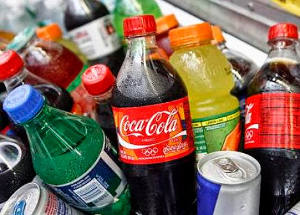 es of Sprite, Coke and other beverages may fall as much as 7% this year at Coca-Cola Femsa SAB (KOFL), according to the company, which is passing the levy on to consumers with price increases. Arca Continental SAB (AC*) projects a decline of about 6%.
es of Sprite, Coke and other beverages may fall as much as 7% this year at Coca-Cola Femsa SAB (KOFL), according to the company, which is passing the levy on to consumers with price increases. Arca Continental SAB (AC*) projects a decline of about 6%. The bottlers’ forecasts suggest that tastes are shifting because of the tax of one peso ($0.08) per liter pushed through Congress last year by President Enrique Pena Nieto to stem a surge in diabetes and obesity. Coca-Cola Femsa, the world’s largest independent packager of Coke, and Arca, No. 2 in Latin America, countered by raising prices about 15%.
“The tax made people aware of the problem, not just because of the price increase but because there’s greater attention to the calorie content and health risks,” Jose Maria Flores, a beverage industry analyst at Grupo Financiero Ve Por Mas, said in a telephone interview in Mexico City. “In the long term, I see a reconfiguration of the market, with increased consumption of water, juice and milk, and less consumption of soft drinks.”
Coca-Cola Femsa has tumbled 16% this year, the ninth biggest decline on the benchmark IPC index of 35 Mexican stocks, which has retreated 6.9%. Pepsi bottler Organizacion Cultiba SAB has fallen 17 percent. Arca Continental has dropped 5.5%.
Coca-Cola Femsa and Arca Continental declined to comment, in e-mailed statements from the companies. So did Cultiba.
Virtual Epidemic
For the Mexican government, the tax, which took effect this year, was seen as necessary to stem a mounting health crisis. About 33% of the country’s population is obese -- the highest obesity rate among nations with more than 100 million people, according to the World Health Organization.
Obesity “is considered virtually an epidemic” in Mexico, and controlling diabetes, which is linked to obesity, is among the nation’s primary public health concerns, the WHO said.
Mexico is the biggest per capita consumer of Coca-Cola Co.’s beverages.
Fidel Cortes, a 45-year-old shoe shiner near Mexico City’s Paseo de la Reforma thoroughfare, said he’s cut back to one or two 600-milliliter bottles of Coke per day after noticing the price climb to nine pesos from eight pesos, an increase on that size of 13%.
He said he relies on the drink to keep him going during the workday, when he averages 10 to 15 customers paying 15 pesos per shine plus tips.
“If before I sometimes had three Cokes a day, now I’m down to one or two,” he said. “It’s because the price went up.”
Blunt Impact
To blunt the tax’s impact on earnings, Mexico City-based Coca-Cola Femsa is cutting jobs, investing less in the country and using more returnable bottles, which will cut costs in the long term, Chief Financial Officer Hector Trevino told analysts and investors last month. While it’s reducing price gaps with competitors in sizes such as two-liter bottles, the company may raise prices again later this year, he said.
Arca Continental is targeting 500 million pesos in 2014 savings from packaging, production, distribution and raw materials such as sweeteners, Chief Operating Officer Arturo Gutierrez said on a Feb. 19 conference call.
While Coca-Cola Femsa could sell less soda at home this year, sales may rise 6.8%to 166.6 billion pesos, according to the average of 15 analyst estimates compiled by Bloomberg, as prices mount and the company folds acquisitions in Mexico and Brazil into its operations. Arca Continental’s revenue is estimated to expand 5.4%, the lowest in nine years, to 63.6 billion pesos. It’s also expanding its South American operations.
Old Habits
It’s too soon to say whether Pena Nieto’s soda tax will lead to a long-term decline in soda drinking, said Karla Miranda, an analyst at Corporativo GBM SAB who recommends holding Coca-Cola Femsa and Arca Continental while buying Cultiba. (CULTIBAB)
Consumers may return to their old habits after rebounding from a broad round of price increases this year, she said. In addition to the soda levy, Mexico also adopted an 8% junk-food tax this year while extending the 16% value-added tax to a broader range of items.
“People have been affected by price increases in a whole range of goods, so they have less disposable income,” she said in a telephone interview from Mexico City. “This year will be a transition and 2015 will be the year when we get a better sense of the soda tax’s long-term effect.”
Mexico is the world’s largest per-capita consumer of soft drinks including soda pop, fruit juice and sports beverages, according to data tracker Euromonitor International. It’s the No. 3 per-capita consumer after the U.S. and Argentina of carbonated sodas such as Coke, Pepsi, Sprite and 7-Up, the market researcher said.
Income Hit
Bloomberg Philanthropies funded media campaigns last year in support of Mexico’s soda tax, part of its efforts to combat obesity, according to its website. The organization is controlled by Michael Bloomberg, the majority shareholder of Bloomberg LP, which owns Bloomberg News.
The Mexican units of Coca-Cola and Pepsico Inc. referred questions to the National Association of Soft-Drink Producers, which declined to comment.
Since the soda tax took effect, Angelica Lopez estimates she’s selling about 20% less in soft drinks at her convenience store near a parish church in southern Mexico City. Known as “Joy,” her store also sells potato chips, candy, fruits and vegetables and is equipped with a red-and-white Coca-Cola refrigerator.
While she’s hopeful warmer weather will rekindle soda demand, she says she understands why people are cutting back.
“If prices go up and salaries stay the same, obviously your purchasing power falls,” Lopez, 39, said. “We’re seeing that with a lot of products and we’re definitely seeing an effect on soda.”





